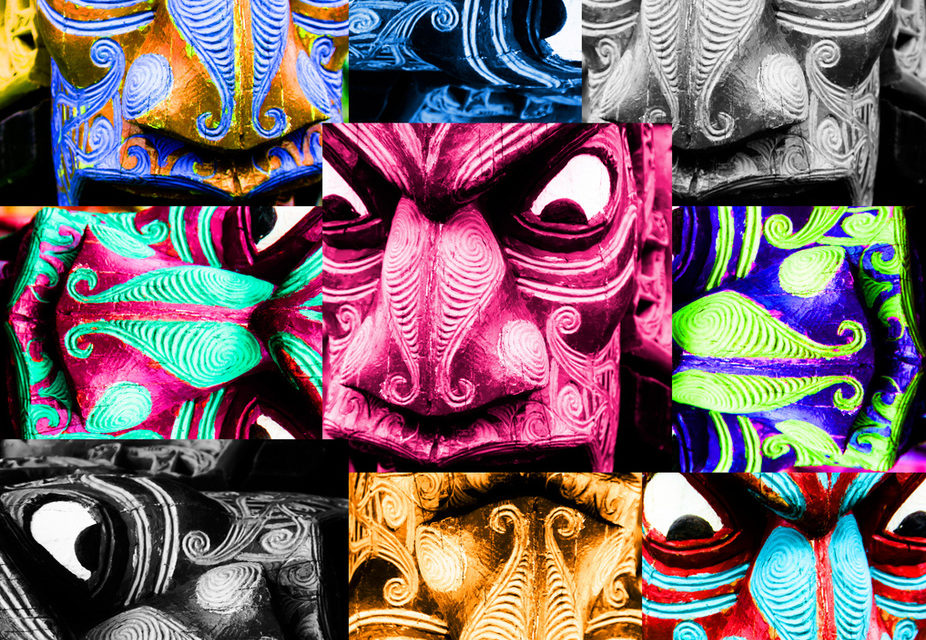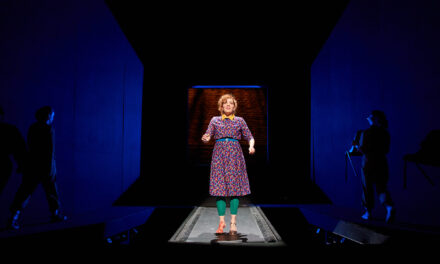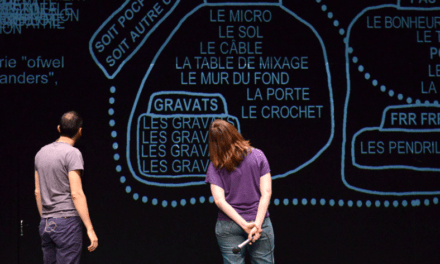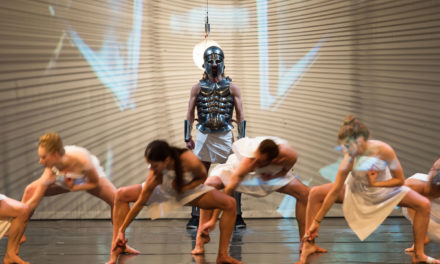
The immigrant mask can take many forms. Photo Credit: IDS.photos/Flickr
Historically, geographically, culturally – there are many points of comparison between Australia and its neighbor to the east, New Zealand. But there are notable differences.
This week, The Conversation, in conjunction with Griffith REVIEW, will publish essays examining issues of marginality and modernity. We’ll run articles on the arts, the environment; on the economic and emotional ties that bind people to land, and land to the rest of humanity. We’ll take a fresh look at the 21st-century world that exists just beyond the ditch.
Winter, a small grocery shop in suburban New Zealand: the opening stage direction of Jacob Rajan’s enduringly popular solo piece Krishnan’s Dairy, first performed at Bats in Wellington in 1997.
A short song describes how Gobi and Zina Krishnan came to New Zealand from India and set up their quintessential Kiwi dairy. Rajan as Gobi appears behind the counter. His face is in half-mask, he puts on a scarf, starts to sing I Say a Little Prayer for You, forgets the words, hums, mimes opening and closing the dairy door, puts out buckets of cut flowers, stares at the moon.
Soon – deftly switching between masks – Rajan will also be Zina, the emperor Shah Jahan and his wife Mumtaz Mahal (in whose memory he built the Taj Mahal), and, at the end of the play years after Gobi is shot by a burglar, Apu, Gobi’s and Zina’s grown-up son.
Theatrically, the use of masks links Krishnan’s Dairy to classical Greek tragedy, Commedia dell’arte, Japanese Noh drama, also religious ritual and observance in many parts of the world. Equally, the masks point to the front, the persona, that immigrants often, perhaps always, feel required to adopt on coming to a new country, to New Zealand, for instance. Gobi’s mask also suggests the stereotypical image that locals sometimes project onto new arrivals: Indians are highly strung, English are snooty, Germans are efficiency-mad, Asians drive badly…
The immigrant mask can take many forms. In her short story The Spy, the Danish-descended Yvonne du Fresne, lightly fictionalizing her child-self as Astrid, describes how in the 1930s she tried to model herself on an English neighbor, a girl of the Empire, making her “spine a ramrod of steel” and rehearsing “a new light, cool voice”:
I prayed that I might choke on one of the afternoon tea cakes, and be brought back from the Dead by a smart thump on my back by Hilary, and recover, and say “Don’t worry – it was nothing.” For that was what Hilary and her friends said when they were thrown by their Shetland ponies.
That certainly wasn’t the approved model or mask 50 years later when I moved to New Zealand from the UK in 1981 ‒ in fact, rather the reverse. This was made clear to me sometimes playfully, sometimes pointedly. One early friend liked to tease me about not grasping that “He’s a good joker” didn’t mean someone was funny, just that he was a good bloke. At a poetry reading I took part in a couple of years later in Christchurch, I was ticked off by a local poet for how English my poems sounded and, by implication, my speaking voice.
The experience transmogrified itself into a poem called The Reading, suggesting in the penultimate line a comic version of the image or mask that the immigrant may find reflected back at them:
The audience has been most polite;
and why not? – jacket, short hair, English, I’m safe enough;
my poems won’t bite….
In the second half (a bit drunk) I start to bluff;
tell a risqué story – which falls flat.
The audience is getting bored,
and so am I. I wonder if I were to strip
– decide it hasn’t come to that.
There are what appear to be two huge tusks growing down over my
upper lip.
I stop. The audience, relieved, applaud.
My kids learned the trick much quicker and more successfully, soon switching accent and idiom between school and home as neatly as Jacob Rajan switched masks.
The accent is always a powerful marker of difference: Gobi’s and Zina’s Indian English; my modified public school English; the German, Polish, Czech, Austrian and Hungarian accents of the Hitler-fleeing refugees Ann Beaglehole chronicles so movingly in A Small Price to Pay. One of these, Gerry Gilbert, apparently “rejoiced when days passed without being asked Where are you from? every time she spoke”.
For some of the wartime German refugees, Beaglehole interviewed the situation was further complicated by their vehement desire to forget their native language, refusing to speak it themselves and refusing to teach it to their children. “Don’t say it in Russian, don’t say it in German / Say it in broken English”, as Marianne Faithful later famously sang in a different context.
Beaglehole makes the obvious but crucial distinction between voluntary and involuntary immigration: “It is the absence of free choice that distinguishes a refugee from a migrant.” In my case, with a growing family, I was (partly at least) running away from what seemed like a paralyzed, already Thatcheritic England which seemed a dispiriting place to bring up children. And I was lucky enough to be running towards a job, a university lectureship.
I was also, like other immigrants before and since, just running. I was born into a post-second world war, fag-end-of-Empire world, and, until he retired, my mother and I followed my British army officer father from posting to posting: London, Ipoh, London, Worcester, Hong Kong, finally Worcester again. From an early age, my inner circuitry was programmed for a move every few years, and as an adult I initially replicated the pattern: university in England, teaching in Hong Kong, teaching in England, teaching in New Zealand.
By contrast, remittance men, like Nicholas Mahs, form a rather special category of immigrant: neither quite voluntary nor involuntary, but forced, often bribed, to live in a colony like New Zealand because of some social misdemeanor or scandal. For Mahs, it was marrying beneath him, and his irate father packed him off from England at the age of 30, together with his wife, to live out the next four decades in Dunedin. The mask that Mahs seems to have adopted, or simply maintained, was that of a gentleman of leisure. One consolation late in his exile came when Lord Kitchener, parading through the streets of Dunedin in 1910, spotted Mahs in the crowd and halted the procession to exchange a few words with his old acquaintance.
Successful reinvention is one possible consequence of being an immigrant, previously unguessed-at energies and potentialities being released by a change of country, together with a lack of former constraints or inhibitions. The Yorkshire-born Russell Haley might be one example; he initially continued as a poet after coming to New Zealand in 1966 but really found his true vein when he turned to fiction. In one short story collection, The Transfer Station, he even deliberately adopts a laconic, blokey persona and narrative voice reminiscent of the local short story writer and novelist Frank Sargeson. Such shifts are hinted at in Krishnan’s Dairy since Gobi seems to be making a reasonable stab at his new shopkeeper role, as the initially reluctant Zina plainly does in the years following Gobi’s death.
Sometimes, for writers, the lost homeland can spring into sharper imaginative relief: Katherine Mansfield wrote her evocative Wellington stories after years in England. Sometimes the loss of a local idiom and audience has less rewarding effects, and reluctance to adapt in the new land, demonstrates a desire simply to replicate a previous role.
That is one way to read Frank Sargeson’s story The Making of a New Zealander, written as an equivocal nod to the 1940 centennial celebrations. The heart of the story is an unresolved conversation between Dalmatian orchardist Nick and the narrator, an itinerant, local farm-worker, about whether either of them is really a New Zealander:
“You think that you and me are born too soon? What do you think?”
He said it over and over, and I couldn’t look him in the face. It had too much of that sadness… I mightn’t have put it in the way Nick had, I mightn’t have said I was born too soon, but Nick knew what he was talking about. Nick and I were sitting on the hillside and Nick was saying he was a New Zealander, but he knew he wasn’t a New Zealander. And he knew he wasn’t a Dalmatian any more.
This is one of those Sargeson stories in which, as Patrick Evans so adhesively put it in The Penguin History of New Zealand Literature, “Someone not very bright is going to tell us something about somewhere not very nice”.
That decade in New Zealand, the 1940s, was one especially preoccupied with questions of national identity. Allen Curnow’s celebrated sonnet “The Skeleton of the Great Moa in Christchurch Museum”, written in 1943, riddlingly explored (at least for Pakeha New Zealanders) the identity problem.
It claimed that the representative speaker, like the extinct moa, though “peculiarly New Zealand’s”, had “failed to adapt”, a point quietly underscored by the poem’s persistent half-rhyme. The payoff comes in the epigrammatic final couplet – “Not I, some child born in a marvellous year, / Will learn the trick of standing upright here” – which both postpones the moment of balance (successful adaptation/assimilation) but also enacts it, since, to a New Zealand ear of the 1940s (though not, tellingly, to an English one), “year” and “here” make a perfect rhyme.
This question of what does or does not constitute New Zealand identity persists. When my son Will, the percussionist in the local band Phoenix Foundation, tried to convert his long-term New Zealand residency into citizenship, he was officially told that touring with the band in the United States, UK and Europe (and promoting local music) meant he was spending too much outside New Zealand to qualify. Only after an 18-month campaign in the media and social media under the slogan “Is Will a Kiwi?” and support from his local MP did common sense eventually prevail.
Citizenship, by birth or adoption, seems an obvious indicator of identity. But what that identity might amount to is still not always clear. A friend, who like me is a bounced Pom, suggested in a recent conversation that many Pakeha New Zealanders do not think they have a distinctive identity but in fact they do. The complication, he argued, arises from a clash between personal drive and the public need to assert a collective identity, to be “just part of the team”, “one of the boys or girls”, the recipient of a “lucky pass”. Kiwis, he thought, want to be, even have to be, different but not tell anyone.
The gold standard for such an attitude remains Edmund Hillary’s throwaway comment after climbing Everest (“We knocked the bastard off”). Which partly explains why the great cricket batsman Martin Crowe was often disparaged, not least by former team mates, as self-regarding, demanding, neurotic, insufficiently rugged. Crowe too disconcertingly asserted his difference, not least in his aesthetic of trying each time he batted to play the perfect innings. In other words, he did not adopt or promote the correct, the acceptable, stance.
Refugees and immigrants are not the only ones to wear masks. To a greater or lesser extent, we all do every day, many times a day. I first became dimly aware of this in a German class at boarding school in England in the mid-1960s. We were studying Alfred Andersch’s novel Sansibar oder der letzte Grund (Sanzibar or the Final Reason).
The novel is set in 1937 in Rerik on the Baltic Sea. The Nazi presence presses in the background. Like the masks in Krishnan’s Dairy, the narrative constantly switches between small casts of belief-challenged characters. Most of these wish, literally or metaphorically, to escape: the local priest, two disillusioned Party members, a boy who wants to be free like Huckleberry Finn, a young Jewish girl on the run.
A friend and I became very taken with a remark that Gregor, one of the faltering communists, makes: “Wenn wir nichts mehr tun, gibt es uns auch nicht mehr” (“If we don’t do anything more, we won’t exist anymore either”). How profound that seemed at 15, more profound perhaps for not being in English. We were rather earnestly trying to make sense of the world, to construct a presentable self, and, like Mrs. Munt in Forster’s Howard’s End, which we were also studying, we “collected new ideas as a squirrel collects nuts, and [were] especially attracted by those that are portable”.
It never occurred to us at the time that our German master, whom we admired for his quicksilver banter and ability to improvise private codes out of lines from our set books (as my friend and I were busily doing), might be also putting on a mask, like Gregor, like Gobi, having to make himself perform.
Many years later, that same friend encountered our German master, now an old man, in a London superette. He told my friend that, within months of retirement, he had been sacked for propositioning one of the boys. Presumably, one day the mask just finally slipped.
The co-editors of Griffith REVIEW: Pacific Highways, Lloyd Jones and Julianne Schultz, and contributors will be discussing all things New Zealand at The Wheeler Centre in Melbourne (Feb 26), National Library of Australia in Canberra (Feb 27), Adelaide Writers Week (Mar 3) and New Zealand Writers Week (Mar 12).
This article was first published on www.theconversation.com. Reposted with permission. Read the original here.
This post was written by the author in their personal capacity.The opinions expressed in this article are the author’s own and do not reflect the view of The Theatre Times, their staff or collaborators.
This post was written by Harry Ricketts.
The views expressed here belong to the author and do not necessarily reflect our views and opinions.


















